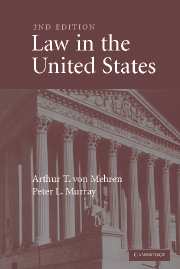Book contents
- Frontmatter
- Contents
- Preface
- CHAPTER 1 THE SOURCES OF AMERICAN LAW
- CHAPTER 2 AMERICAN COMMON LAW
- CHAPTER 3 COMPARATIVE PERSPECTIVES ON AMERICAN CONTRACT LAW
- CHAPTER 4 AMERICAN FEDERALISM
- CHAPTER 5 AMERICAN CONSTITUTIONAL LAW AND THE ROLE OF THE UNITED STATES SUPREME COURT
- CHAPTER 6 AMERICAN CIVIL JUSTICE
- CHAPTER 7 AMERICAN CRIMINAL JUSTICE
- CHAPTER 8 AMERICAN TRIAL BY JURY
- CHAPTER 9 CHOICE OF LAW, INTERNATIONAL CIVIL JURISDICTION, AND RECOGNITION OF JUDGMENTS IN THE UNITED STATES
- CHAPTER 10 THE AMERICAN LEGAL PROFESSION
- CHAPTER 11 THE UNITED STATES AND THE GLOBAL LEGAL COMMUNITY
- Index
CHAPTER 3 - COMPARATIVE PERSPECTIVES ON AMERICAN CONTRACT LAW
Published online by Cambridge University Press: 05 June 2012
- Frontmatter
- Contents
- Preface
- CHAPTER 1 THE SOURCES OF AMERICAN LAW
- CHAPTER 2 AMERICAN COMMON LAW
- CHAPTER 3 COMPARATIVE PERSPECTIVES ON AMERICAN CONTRACT LAW
- CHAPTER 4 AMERICAN FEDERALISM
- CHAPTER 5 AMERICAN CONSTITUTIONAL LAW AND THE ROLE OF THE UNITED STATES SUPREME COURT
- CHAPTER 6 AMERICAN CIVIL JUSTICE
- CHAPTER 7 AMERICAN CRIMINAL JUSTICE
- CHAPTER 8 AMERICAN TRIAL BY JURY
- CHAPTER 9 CHOICE OF LAW, INTERNATIONAL CIVIL JURISDICTION, AND RECOGNITION OF JUDGMENTS IN THE UNITED STATES
- CHAPTER 10 THE AMERICAN LEGAL PROFESSION
- CHAPTER 11 THE UNITED STATES AND THE GLOBAL LEGAL COMMUNITY
- Index
Summary
LOOKING AT LAW COMPARATIVELY
There are many ways in which a body of law can be studied and learned. At this point, we can probably ignore obsolete approaches such as rote memorization. Among the current methods, the historical approach focuses on the evolution of law and legal institutions over time, the systematic method looks at the way with which the various elements of the law work together as a system, and law and economics analyzes the way legal precepts form and reflect economic interrelationships.
The comparative method of law pedagogy attempts to analyze the way legal doctrine and institutions of the body of law under study compare with doctrine and institutions of other legal systems. The techniques of comparative law enable the student to take a social, economic, or governmental problem common to the respective political economies of both of the legal systems under study and study how the respective systems address and solve this particular problem. The solutions can be compared in terms of economic efficiency as well as systemic consistency and harmony with common social, political, and moral values.
For students already familiar with the doctrine and systemic elements of one legal system, the comparative method presents particular advantages in learning and coming to terms with a new body of law. Comparative analysis enables one not only to acquire familiarity with another legal system but also to obtain new and critical insights into one's own legal system.
- Type
- Chapter
- Information
- Law in the United States , pp. 71 - 102Publisher: Cambridge University PressPrint publication year: 2007
- 1
- Cited by



